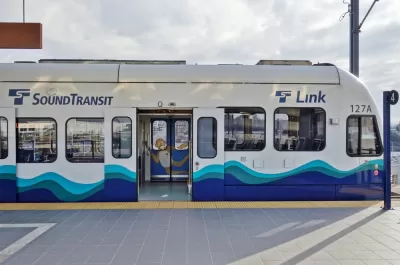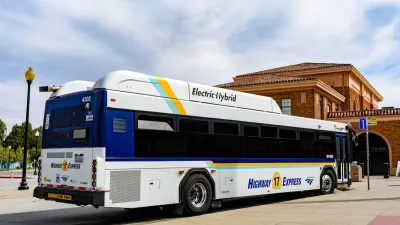Traditional strategies seek to attract major employers but often neglect the transportation networks that make commuting possible and convenient for more workers.

Despite evidence that "any employer, big or small, stands to benefit from an improved transportation network that shortens commutes," transportation and access have remained low priorities in economic development strategies, writes David Zipper in Bloomberg CityLab. Rather than focusing on creating effective transit networks that benefit all users, "business attraction remains a linchpin of local economic development, a field whose emphasis on tax breaks, real estate development and job training can seem frozen in time."
But "[b]y encouraging businesses to concentrate in convenient locations — and by demanding that infrastructure investments reduce commute times — economic developers can position their regions for productivity gains that will lift employers and workers alike." The period of readjustment after the pandemic, argues Zipper, "is an ideal time to shake things up. The pandemic-triggered rise of teleworking is making companies reassess location decisions, which will force economic developers to update their toolkits. That creates a golden opportunity to modernize their field by finally embracing the crucial role that transportation plays in fostering economic growth."
"Evaluated through this lens, projects like a new bus rapid transit line or an office complex placed atop a rail station will be economic development catalysts if they can reduce the region’s commute burdens. Conversely, a business park or residential community situated on the urban periphery, far from transit and major highways, will lengthen average commutes and take a toll on employers’ competitiveness." Yet, because of the long-term nature of transit projects and the short-term nature of political terms, these "[m]isaligned incentives present an obstacle to elevating the role of transportation in local economic development." For now, "we continue to see high-profile and expensive corporate recruitment campaigns" that ignore the high cost of worker commutes.
FULL STORY: It's Time for Economic Developers to Focus on Transportation

Planetizen Federal Action Tracker
A weekly monitor of how Trump’s orders and actions are impacting planners and planning in America.

Restaurant Patios Were a Pandemic Win — Why Were They so Hard to Keep?
Social distancing requirements and changes in travel patterns prompted cities to pilot new uses for street and sidewalk space. Then it got complicated.

Map: Where Senate Republicans Want to Sell Your Public Lands
For public land advocates, the Senate Republicans’ proposal to sell millions of acres of public land in the West is “the biggest fight of their careers.”

Maui's Vacation Rental Debate Turns Ugly
Verbal attacks, misinformation campaigns and fistfights plague a high-stakes debate to convert thousands of vacation rentals into long-term housing.

San Francisco Suspends Traffic Calming Amidst Record Deaths
Citing “a challenging fiscal landscape,” the city will cease the program on the heels of 42 traffic deaths, including 24 pedestrians.

California Homeless Arrests, Citations Spike After Ruling
An investigation reveals that anti-homeless actions increased up to 500% after Grants Pass v. Johnson — even in cities claiming no policy change.
Urban Design for Planners 1: Software Tools
This six-course series explores essential urban design concepts using open source software and equips planners with the tools they need to participate fully in the urban design process.
Planning for Universal Design
Learn the tools for implementing Universal Design in planning regulations.
Heyer Gruel & Associates PA
JM Goldson LLC
Custer County Colorado
City of Camden Redevelopment Agency
City of Astoria
Transportation Research & Education Center (TREC) at Portland State University
Camden Redevelopment Agency
City of Claremont
Municipality of Princeton (NJ)





























